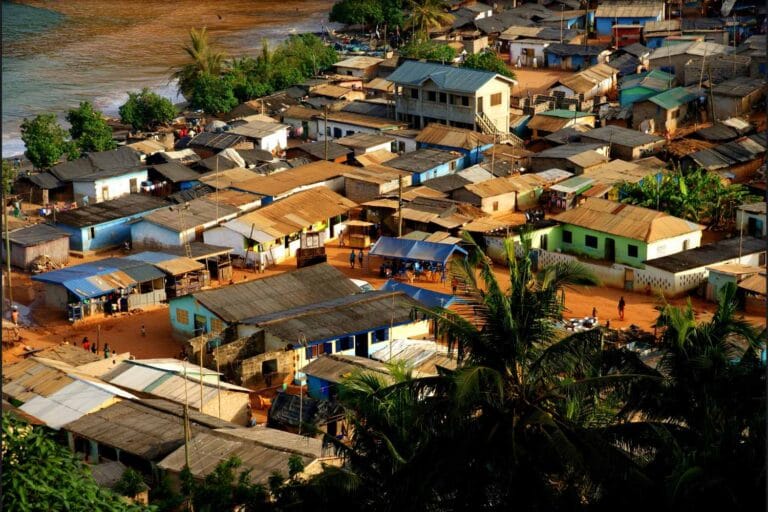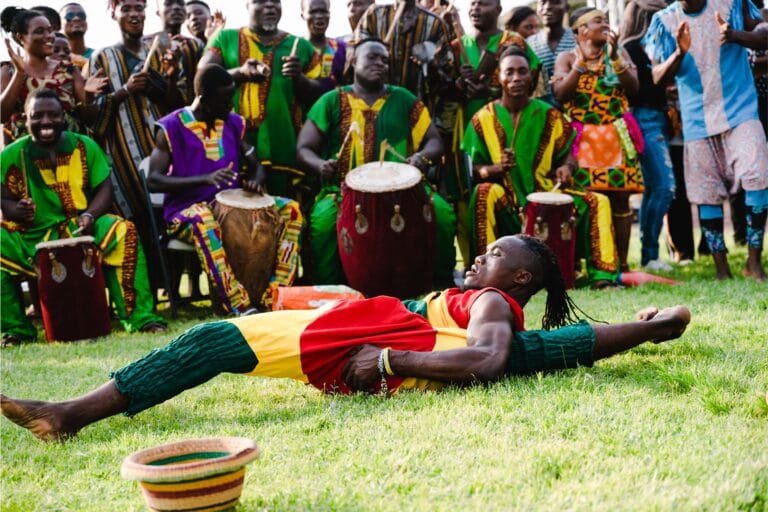Cultural tourism in Ghana is your gateway to experiencing the soul of this lively West African nation. Colorful festivals and authentic village life showcase Ghana’s warm hospitality. Yet there’s so much to explore. Whether you’re witnessing the energy of a durbar or learning the art of kente weaving, Ghana offers unforgettable cultural experiences.
Each year, people from all over the world make their way to Ghana to experience all it offers. People from the African Diaspora are also making their way home to experience the rich vibrant life of West Africa. In this blog let’s look at how Ghana’s cultural tourism can bring you closer to its rich heritage and lively traditions.
1. Exploring Traditional Villages

Ghana’s cultural tourism invites you to step into a world where history, tradition, and daily life come together in perfect harmony. The country’s villages are more than just places to visit. They are vibrant communities that offer a window into the diverse heritage of Ghana’s ethnic groups. From sacred shrines to intricate crafts, these villages provide an immersive experience that connects you to the Ghanaian culture.
Ghana’s traditional villages are living museums where you can experience the authentic lifestyle of various ethnic groups. Each village has its own distinctive culture, architecture, and traditions. Here is my list of notable ones to visit:
Nzulezo Stilt Village (Western Region): This location is a UNESCO World Heritage Site. It has been entirely built on stilts over Lake Tadane. This is your way of experiencing the serene environment and learn about the ingenious ways the Nzulezo people have adapted to their surroundings.
Larabanga (Northern Region): Home to the oldest mosque in Ghana, this village is a spiritual center for Muslims and a significant historical site.
Kente Weaving Villages (Ashanti Region): Visit villages like Bonwire to see master weavers create intricate Kente cloth. Their showcase is a symbol of Ghanaian pride and heritage. You can even try your hand at weaving!
Tongo (Upper East Region): Famous for its Tengzug Shrine, this village offers insight into traditional religious practices. You also enjoy stunning views of the surrounding landscapes.
2. Participating in Festivals

Festivals in Ghana go beyond events—they’re vibrant celebrations that bring communities together and showcase the nation’s rich cultural heritage. These lively gatherings are an explosion of music, dance, and rituals, offering visitors an opportunity to connect deeply with Ghanaian traditions.
From historic commemorations to modern artistic expressions, Ghana’s festivals are unforgettable experiences that highlight the spirit and creativity of its people.
Festivals are a cornerstone of Ghana’s culture tourism, offering a colorful display of music, dance, and rituals. Participating in these events allows you to celebrate with locals and learn about their traditions.
Here is a list of major Ghanaian festivals:
Homowo Festival (Greater Accra Region): This festival is celebrated by the Ga people. It honors the end of a famine with feasting, drumming, and dancing.
Akwasidae Festival (Ashanti Region): This festival is held every six weeks at the Manhyia Palace in Kumasi. Witness the grandeur of the Asantehene (King of the Ashanti) and vibrant cultural performances.
Hogbetsotso Festival (Volta Region): This is a festival that commemorates their migration from Notsie in Togo to present-day Ghana. It features traditional drumming, dancing, and storytelling.
Chale Wote Street Art Festival (Accra): This is one festival that is celebrated in Accra. It blends contemporary art with Ghanaian culture, showcasing street performances, murals, and installations.
3. Ghana's Cultural Tourism Requires Etiquette and Respect
It is important to show respect to local villages when you attend their festivals. There are certain norms that you must know about and adhere to on your visit to these cultural events. This is key to having the best festival experience of your life.
The following are some key tips to help you engage respectfully:
- Dress Modestly: The way you dress is very important in Ghanaian village life. Choose clothing that covers your shoulders and knees, especially when visiting sacred sites or rural areas.
- Seek Permission: Never take a photo without asking permission. This way to limit the chance of offending anyone, especially when there are sacred ceremonies or at sacred sites.
- Learn Local Phrases: Next you must learn local phrases to help you communicate better and more respectfully with the locals. Simple words like “akwaaba” (welcome) and “medaase” (thank you) go a long way in connecting with locals and showing appreciation.
- Participate Respectfully: If invited, join in dances or rituals, but be mindful not to disrupt or detract from the ceremony.
By following these tips, you’ll show your respect for Ghanaian culture and enhance your experience.
Cultural Etiquette in Ghana: Helpful Tips for New Diasporans
4. Supporting Local Communities Will Encourage Ghana's Cultural Tourism
One of the key aspects of Ghana’s cultural tourism is supporting the locals. Always remember that tourism is a way of bringing in revenue to the visited location. On this basis, be sure to support the local area you visit. When you support local tourism efforts, you will help to preserve them for years to come. Some of the best ways to show your support are:
- Shopping Local: Support local artists by purchasing their handmade crafts. You will see a lot of Kente cloth, beads, or carvings.
- Choose Local Accommodations: You can also choose to stay at a local accommodation. Staying in locally-owned accommodations will directly benefit the local economy of that area.
- Dine Locally: Food is a must. So why not eat locally. When you do this you’ll support the local people and enjoy some of Ghana’s best tastes.
By embracing cultural tourism, you’ll not only create unforgettable memories but also contribute to the sustainability of Ghana’s vibrant traditions.
5. Planning Your Visit to Witness Ghana's Cultural Tourism
Ghana’s Cultural Tourism offers an enriching experience that goes beyond sightseeing. To make the most of your cultural journey in Ghana, it’s essential to plan ahead and make thoughtful choices that enhance your connection with the local culture.
To make the most out of your trp to Ghana, try the following:
- Research Festival Dates: Many festivals follow traditional calendars, so confirm dates before planning your trip to ensure you don’t miss out on key events.
- Hire Local Guides: When navigating local community events, a knowledgeable guide can be your best bet. They will offer valuable insights into cultural practices. They will also educate you on the dos and don’ts to pay attention to.
- Combine with Other Attractions: Pair your cultural exploration with visits to Ghana’s natural wonders, like Kakum National Park or the Volta Lake, for a well-rounded experience that blends history, nature, and adventure.
By taking these steps, you’ll create a deeper, more meaningful connection with Ghana’s culture while enjoying all that this beautiful country has to offer.
Final Thoughts
You cannot make the most out of Ghana without getting involved in its cultural tourism. Cultural tourism in Ghana is the best way to dive deep into the countries rich culture and get intimate with its people. It is also a way to learn about this unique West African paradise while building lasting memories to keep for a lifetime.
As you get involved in Ghana’s cultural tourism, remember to support the local economy. Whether you’re learning the art of Kente weaving or witnessing the grandeur of a festival, you’ll leave with a profound appreciation for the country’s heritage. Ghana’s cultural tourism will undoubtedly leave a lasting imprint on your soul, making your journey unforgettable. Remember to embrace the spirit of “akwaaba” (welcome) as you explore Ghana’s cultural treasures.











